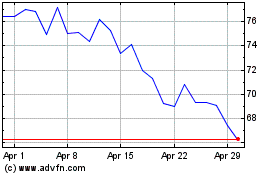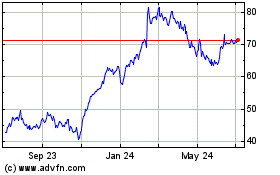Uber Co-Founder Travis Kalanick Quits Board After Selling Entire Stake
December 24 2019 - 1:40PM
Dow Jones News
By Eliot Brown
Travis Kalanick is parting ways with Uber Technologies Inc., the
company he co-founded and turned into an icon of startup ambition
before his tumultuous ouster as CEO in 2017.
Uber announced Tuesday that Mr. Kalanick would leave the board
of directors at the end of the year. The decision comes as Mr.
Kalanick has sold out his entire position in Uber over the past two
months, according to his spokeswoman, netting over $2.7
billion.
Mr. Kalanick said in a statement that "it seems like the right
moment for me to focus on my current business and philanthropic
pursuits."
The exit punctuates a decade in which Silicon Valley investors
pumped startups with extraordinary sums of money and granted their
founders vast power and a mandate to grow at breakneck speeds.
Uber and Mr. Kalanick were the archetype of this model, as Mr.
Kalanick raised over $14 billion in equity and debt from outside
investors who bought into his expansive vision and energetic
approach. At its peak, Uber was the most valuable startup in the
U.S., with a valuation of about $68 billion.
But Mr. Kalanick's reign as chief executive was marked by a
pileup of scandals, including the use of software meant to evade
regulators, and complaints about a chauvinistic workplace culture
at Uber. Such revelations were not only distasteful to many of his
investors, but led Uber's market share to fall and allowed its main
U.S. competitor Lyft Inc. to raise new money while it was on the
verge of running out of funds.
The scandals culminated in Mr. Kalanick's spectacular ouster by
his investors in 2017, but he remained one of its biggest
shareholders and an important presence on the board.
Uber has said it has discontinued the regulatory evasion
technique and it has sought to reshape its culture.
The tumult atop Uber shared similarities with that of WeWork,
which was the country's most valuable startup earlier this year.
After an aborted IPO in September, investors pushed out WeWork
founder and Chief Executive, Adam Neumann, amid concerns about the
company's swelling losses, conflicts of interest with Mr. Neumann
and his erratic management style.
In the announcement Tuesday, Uber CEO Dara Khosrowshahi said all
of Uber wishes Mr. Kalanick well.
"I'm enormously grateful for Travis' vision and tenacity," he
said.
Still, Mr. Kalanick's relationship with the current Uber
management team has been far from cheery. He felt snubbed when he
wasn't invited on stage with the team for the ceremonial bell
ringing to mark the start of trading at the New York Stock Exchange
on the day of Uber's initial public offering in May. And Mr.
Kalanick's recruitment of Uber staff to his new startup has caused
grumbling at the ride-hailing giant, people familiar with the
matter said.
The move by Mr. Kalanick to sell his shares was set in place
multiple months ago, said people familiar with the matter, and
called for him to sell shares daily until his holdings wound down
to zero.
The results are far less lucrative than he or others had hoped
earlier this year. Uber's stock has performed terribly since its
May IPO, down more than 30% from the $45 a share offering, even as
the company's performance has exceeded analyst forecasts. Shares
gained about 0.7% Tuesday.
Uber's market woes come as Wall Street investors have proven far
more skeptical of the heavy doses of red ink coming out of Silicon
Valley startups than investors and Uber predicted a few years ago,
when private investors poured billions into such companies. Uber
lost $1.2 billion in the third quarter alone, and has said it would
be 2021 before it reports positive earnings -- and then only when
excluding costs like interest, taxes and depreciation.
Uber's future has also been clouded by the rapid growth of
competitors like DoorDash in the food delivery space, which has
overtaken Uber's Eats operation and leads the U.S. market.
In its main ride-hailing business, governments around the globe
are gradually layering on new rules and fees, catching up for what
regulators view as years of lax oversight.
Despite efforts by the company to speed up a turn to
profitability, some early investors in the company have grown
weary.
"There's very little at the company to be excited about," said
Bradley Tusk, CEO of Tusk Holdings who got Uber shares when he
helped the company break into the New York City market early in its
history. He said he recently sold all his Uber stock.
Mr. Kalanick has turned his attention to a new business not
terribly far from the one he built this past decade. His startup
CloudKitchens builds commissary kitchens for restaurants that want
space to prepare food for delivery-only. Drivers from Uber Eats,
DoorDash and others shuttle the food to customers.
While he has been funding the business with some of his personal
wealth, he also raised $400 million from a Saudi Arabia
sovereign-wealth fund earlier this year, people familiar with the
matter have said.
--Micah Maidenberg contributed to this article.
Write to Eliot Brown at eliot.brown@wsj.com
(END) Dow Jones Newswires
December 24, 2019 13:25 ET (18:25 GMT)
Copyright (c) 2019 Dow Jones & Company, Inc.
Uber Technologies (NYSE:UBER)
Historical Stock Chart
From Apr 2024 to May 2024

Uber Technologies (NYSE:UBER)
Historical Stock Chart
From May 2023 to May 2024
